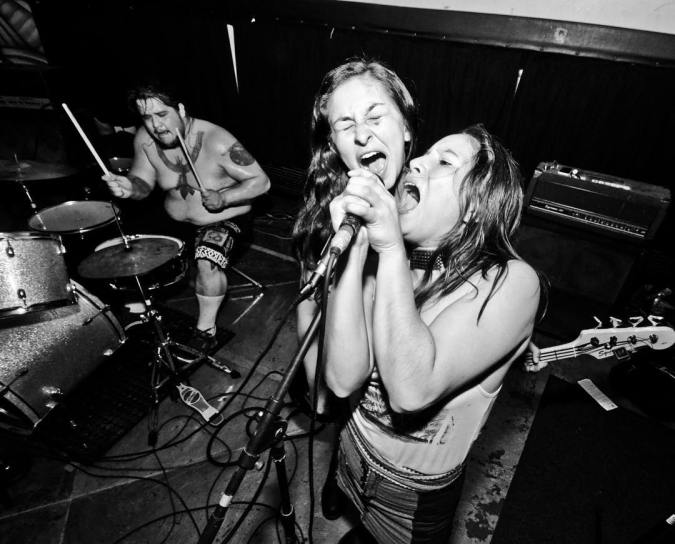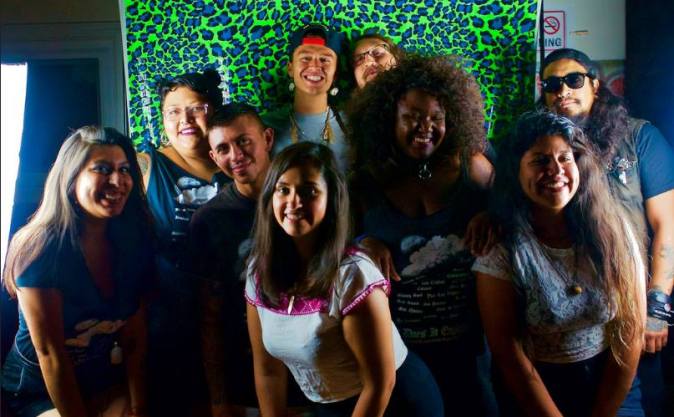As a teenager growing up in Chicago, Lucila Saldaña saw firsthand the whiteness of punk, and just how thoroughly populated and controlled by white people — cisgender heterosexual white men, specifically — it can be. But today, at 29, she’s officially put a dent in dismantling that patriarchal norm.
Along with other core organizers and support from countless others, Saldaña is essentially reclaiming the genre’s roots. The music, although important, is the medium for a greater mission: Chicago’s DIY Black and Brown Punk Show Collective is bridging gaps and striving to uplift the city’s communities of color, including LGBTQIA people.
“I’m sure folks know that Chicago is an extremely segregated city,” Saldaña says. “We want to unite all of that instead of continuing the segregation of black and brown folks and people of color in general. We want to start unifying us as a force within punk.”
Black and Brown is a year-round endeavor, with an annual festival whose 2017 edition took place late last month. Created in 2010 by Monika Estrella Negra and Donté Oxun after the pair organized a punk show benefiting an underground library and art space, Black and Brown quickly grew to include a series of events, from two-day blowouts to single-night shows. Funds raised through festival passes, cover charges, and sales of art, DIY patches, zines and more go toward artist payment in part, but are also delegated to impactful organizations and directly to individuals in the community in financial need. This year, Assata’s Daughters, an intergenerational collective of radical black women, and the Black, Trans, and Gender Non-Conforming Collective, both of which are based in Chicago, were the primary recipients of festival proceeds.

“We try to help as many black and brown folks as we can, whether they’re getting arrested for doing a protest or there’s an ICE raid. We try to help them out as much as possible,” Saldaña says. “[We want them] to know that we’re there, and there’s a space for them to be able to reach out to us, and for us to help them.”
“These radical DIY spaces are our resistance.”
Or Does it Explode?, the fest’s theme this year, was an homage to the powerful ending of Langston Hughes’ poem “Harlem.” Saldaña was able to put her skills as an artist toward creating a banner bearing a punkified version of Hughes, complete with leather jacket, septum piercing, and dangly earring.
Saldaña’s zine debuted at the festival — the first issue via her Latinx group, Raras Colectivo — alongside a slew of other vendors. In keeping with Black and Brown’s ethos, part of the programming included a youth-oriented zine-making workshop in which participants learned the history of the medium and ultimately created their own zine.
That was just one of many workshops offered during the festival; there was also an embroidery 101 session focused on processing internalized and expressed anti-blackness, transmisogyny, and femmephobia. A talk-and-teach for safety-promoting rituals and spells, and a discussion about the effects of militarization at the Mexico border were also offered.

Shanna Collins, who started her work with Black and Brown by arranging an April fundraiser in collaboration with Dyke March, says Chicago’s punk scene is a cathartic salve. “I first started getting into punk probably around 2013 after the Trayvon Martin case,” she says. “I was really really angry and I was looking for an outlet for my anger, especially with a lot of the politics going on. Monika [Estrella Negra] actually was the one who invited me to a punk show on the South Side; it was actually at a church, and I just saw a bunch of people in the mosh pit pushing white people, really allowed to express their anger. I was like, ‘I really like this, I really fuck with this,’ and I wanted to get more involved in it…When it came time to organizing the festival for this year, I really wanted to get involved, because particularly there’s a lack of black women in punk spaces in Chicago, and I really wanted to make that presence visible.”
Saldaña also notes that maintaining an open line of communication between the community and organizers is paramount to the group’s mission. “I think that’s the most important part, especially when you’re doing something so big as Black and Brown Punk Show. As core members, it’s our responsibility to be aware of what’s happening within our community and have an open line of communication with us and folks within the community to let them know that we, as a collective – we care about making folks comfortable and safe and respecting the space,” she says.
In the collective’s mission to underline the shared struggles of black and brown communities as a route to unifying them, that stringent policy is necessary. Collins also stressed that, for her, hierarchies in organizing can be a hurdle in maintaining those values. “You’re there to serve the community; you are part of the community,” she says.
Black and Brown Punk Show Collective’s work showcases that community manifested in real life, built on years of activist labor. The crew continues to cultivate and nurture year-round, through events that join black and brown and LGBTQIA communities in upholding the collective’s ethos, educating the communities it serves through workshops and lectures, raising funds for those in need, and fortifying a culture of mutual support. They aim to take their efforts to the next level in 2018, with an offshoot collective called Or Does It Explode: Black, Brown, and Indigenous Crew that focuses on punk, as well as “reggae, salsa, voguing, etc. in order to bring a more inclusive radical, musical vision within our communities,” as described in a recent Facebook post.
Collins felt proud to live in Chicago for the first time in a while. “The festival was a dream come true,” Collins says. “We wanted to create a space free of anti-Blackness, anti-queer sentiment, ableism, and misogyny so marginalized people could be celebrated, and people loved it. These radical DIY spaces are our resistance.”
Editor’s note: A previous version of this piece erroneously implied that Black and Brown Punk Show Collective had launched an accountability process with a former member accused of abuse. The piece has been updated to retract mention of the abuse.




